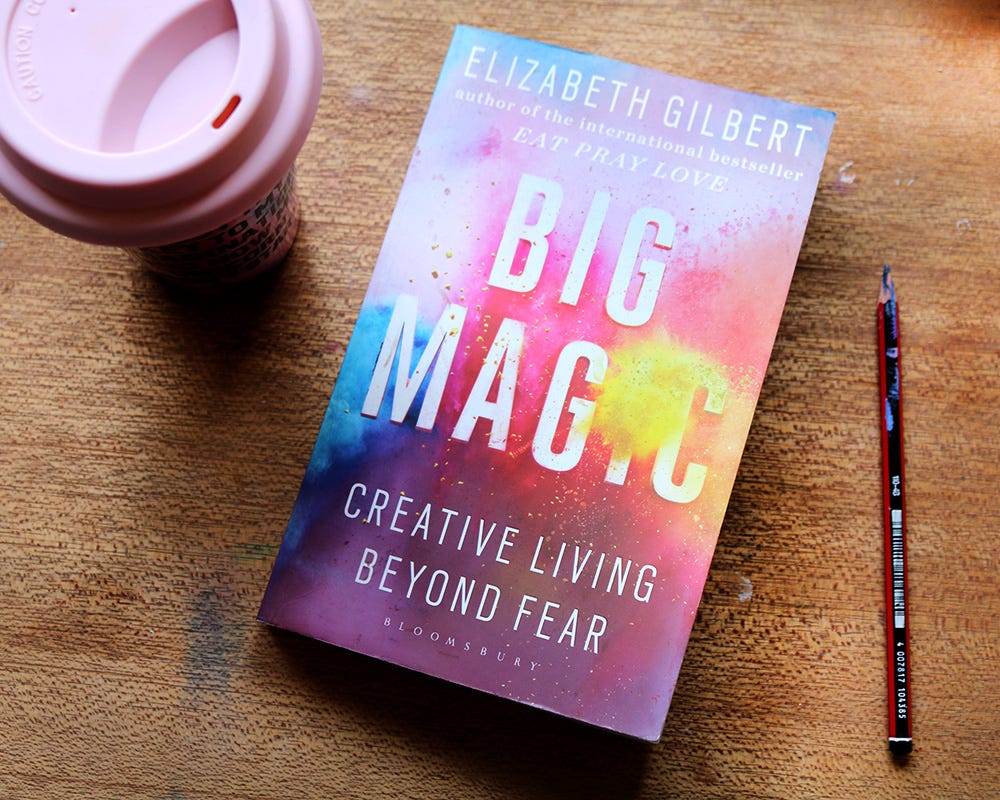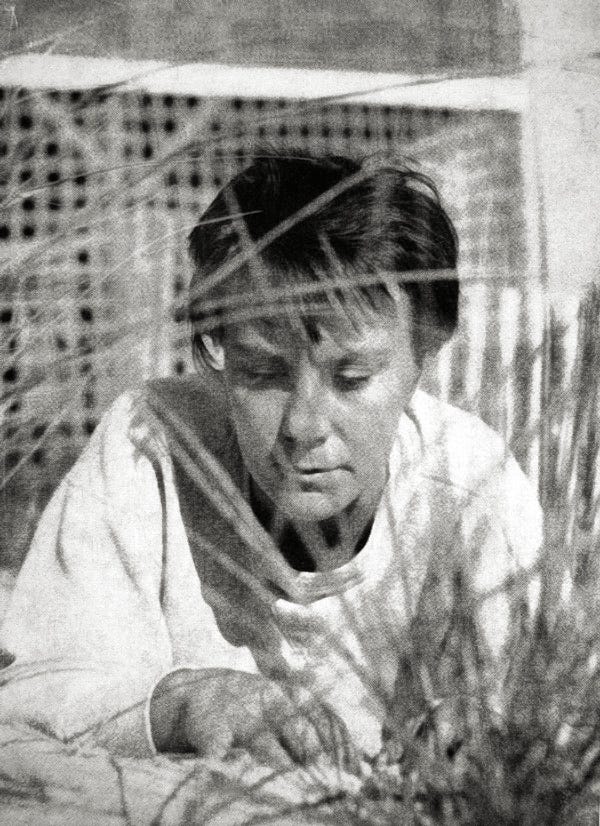Thanks to everyone who wrote in with book recommendations, I now have a list of memoirs long enough to keep me company through several more pandemics.
I’m working my way up to sharing something I made. It might be in the next newsletter (maybe?).
But for now I want to tell you about something I’m reading that grabbed my brain pretty hard. Big Magic, by Elizabeth Gilbert.

I have a loose policy when it comes to deciding what to read or watch or listen to. There are two ways I’ll pick something up.
Way One is simple: if any three different people recommend something, I’ll check it out. Like, if my mom, Emily Nussbaum, and my friend Brendan all like a movie, I want to see that movie to try to figure out what about it is speaking to all of them.
Way Two is if a friend keeps insisting I pick something up, to the point where I feel like I’m starting to low-key offend them if I don’t.
I came to Big Magic via Way Two. A friend kept pushing it.
I’ve never read Elizabeth GIlbert. I knew she wrote Eat, Pray, Love. I haven’t read it. I knew from friends who enjoy her work that the astronomical, every-airport-bookstore success that book had achieved sometimes occluded the fact that she’s a very smart, entertaining writer. As in, she’d become too successful for some of the cool kids to check her out, even though the cool kids might actually like her.
I knew that and understood it but I also felt like … Elizabeth Gilbert is probably doing fine without me reading her books.
And I was right, I’m sure she’s fine. But was I fine? Maybe not.
I’m not finished with Big Magic, but I’m really enjoying it.
It’s about creativity. It’s about how and why people come up with ideas, how to battle the dragon in your head that tells you that the thing you want to make isn’t good enough, that it’s just going to embarrass you.
Gilbert has a fairly spiritual belief about creative ideas which is basically – our ideas don’t belong to us. They exist somewhere in the aether, and they visit us occasionally if we’re quiet and pay attention.
I’ve heard people talk that way before, and I always believed it could be a useful way to think. A method for evading the destructive auto-immune response of our own egos — if we can believe that our ideas aren’t ours, then we don’t have to hate them.
It’s a nice thought in theory, but so are exercise and eight hours of sleep a night. But Big Magic has been helping me actually practice it.
The moment I was bought into the book and its premise was after this story Gilbert tells about a great idea she had for a novel. She got busy, didn’t write the book, and eventually, a book with that exact (and unique) plot was written, but by someone else. The book turned into a big bestseller. Gilbert talks about meeting that writer. I’m not going to spoil that story, but you should read it.
The other part I’ve been lingering on is this section where she writes about Harper Lee, an author I hadn’t thought about since high school.
I hadn’t thought about her, but I do think good books stay inside you like dreams, and I’ve always had that with To Kill A Mockingbird. I don’t remember the story, it’s been decades, but I do remember the feeling of Boo Radley.
Lee was only 34 when To Kill A Mockingbird was published. I hadn’t known that.
It had also never occurred to me to wonder how many equally great books she wrote afterwards? Do you know how many? While you take a second to guess, here’s a nice picture of Harper Lee that Truman Capote took.
OK. The answer is – essentially zero? After Mockingbird, Lee went quiet for five decades. Technically, she released one more book, but it was when she was 89 years old, right before she died. And even that book was a manuscript she’d written before Mockingbird, it had some of the same passages.
There’s writer’s block but then there’s writer’s block. Here’s Lee at 34, after her hit book was published.
“I never expected any sort of success with Mockingbird. I was hoping for a quick and merciful death at the hands of the reviewers, but at the same time I sort of hoped someone would like it enough to give me encouragement. Public encouragement. I hoped for a little, as I said, but I got rather a whole lot, and in some ways this was just about as frightening as the quick, merciful death I'd expected.”
This is what Elizbeth Gilbert is interested in, this horrific writer’s block. And she’s the right person to talk about Lee’s case, of writer’s block brought on by success. Because while neither you nor I have ever had the misfortune of writing a national mega-hit book – Gilbert actually has.
And she uses her experience with Eat, Pray, Love as a jumping off point to talk about something much more universal – the chittering little demons of desire and comparison that stand between anyone and their basic human instinct toward creation. Gilbert talks about how after she wrote her big book, friends would come to her and ask how she could ever top it, a question that she chose not to relate to.
“... such thinking assumes there is a “top” — and that reaching that top (and staying there) is the only motive one has to create. Such thinking assumes that the mysteries of inspiration operate on the same scale that we do — on a limited human scale of success and failure, of winning and losing, of comparison and competition, of commerce and reputation, of units sold and influence wielded. Such thinking assumes that you must be constantly victorious — not only against your peers, but also against an earlier version of your own poor self. Most dangerously of all, such thinking assumes that if you cannot win, then you must not continue to play.
But what does any of that have to do with vocation? What does any of that have to do with the pursuit of love? What does any of that have to do with the strange communion between the human and the magical? What does any of that have to do with faith?”
I am not, at present, writing a classic American novel. I am not writing a megahit bestseller about how I found myself. At this point, I’m not even making a podcast.
If I’m honest with you, right now just writing this tiny newsletter is not particularly easy for me. Writing feels uncomfortable, but I do it because not writing feels more uncomfortable.
Two funny places to find myself stuck between, but I am stuck between them, and I find encouragement in the idea that we’re all in the same unpleasant fight against fear and ego.
OK. See you next time,
PJ
PS. I switched over from Mailchimp. It felt strange to pay to send out a free newsletter.
PPS. Please do not forget that just because two newsletters come out a week apart, that does not mean a newsletter is “weekly.”




Glad to have you back!
If you are pondering what to do next, how about a podcast about the internet? There used to be one by a couple of interesting guys but it doesn't talk about internet-related stuff any more and has become boring. There is a gap in the podcast-space!
This was lovely. Agree with the comments about being able to read this with PJ's voice in my head. For a number of years Reply All was my favourite podcast - years went things weren't going so great for me - and PJ and Alex were my friends.